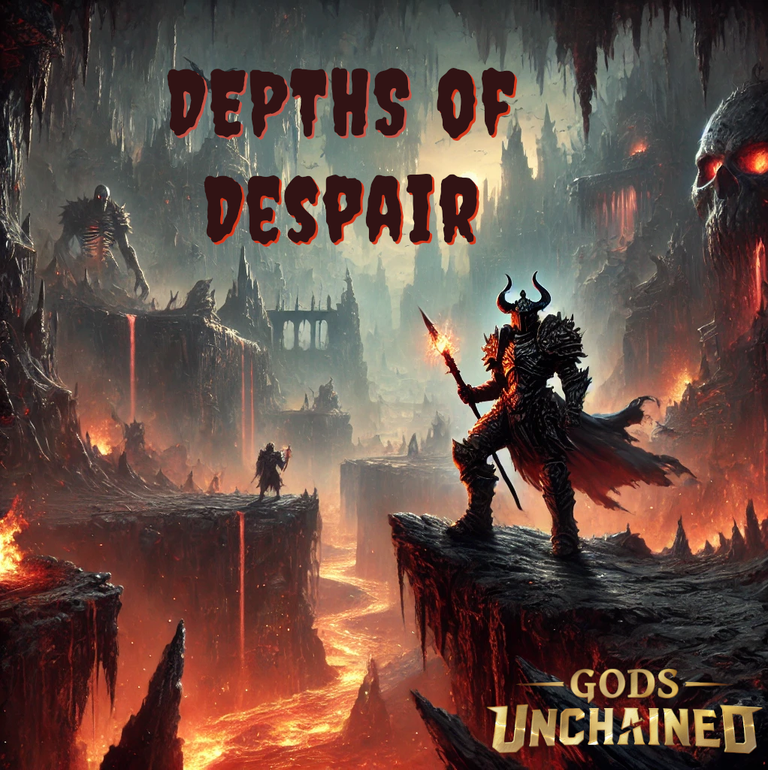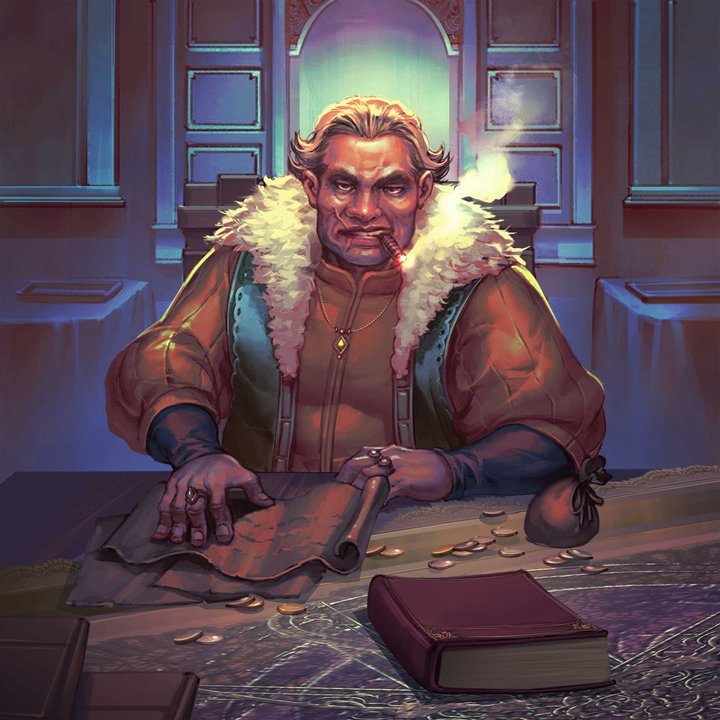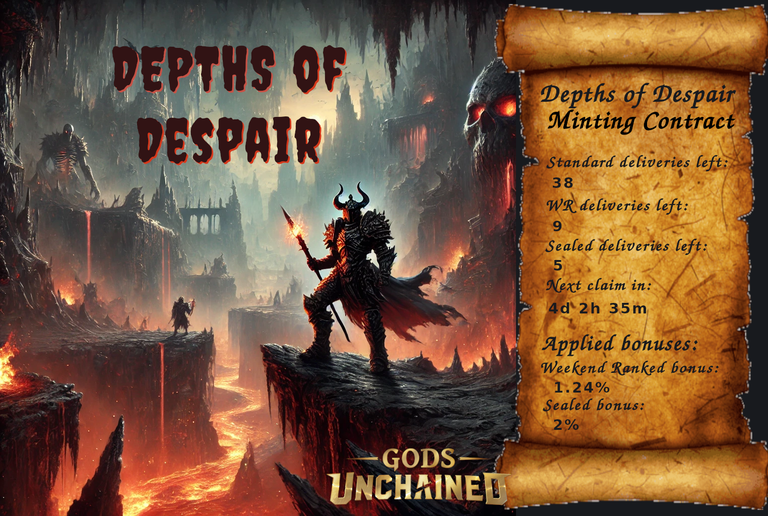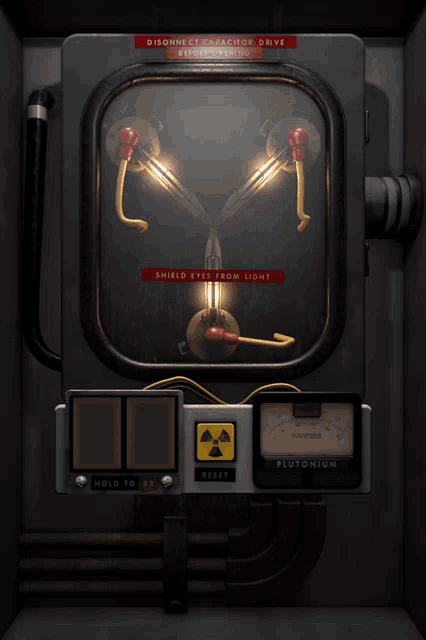Introduction

I had a crazy idea about releasing an expansion with a different commercialization model, inspired by some ideas I've been gathering on another post about possible things of value for Gods Unchained.
In this post I will lay out the most important points of this model. It's just a creative exercise, for fun.
Unlike the current approach where most cards obtained from packs are minted within a few days of an expansion's release, this model mints cards gradually over an extended period of time. The main method of generating cards would be via a 'contract' NFT. This item would generate random expansion cards, until depleted.
The slower availability of new cards would mean they would retain their value for longer and balance out the supply with the demand for cards to forge higher quality versions (in more demand now with the new DP&E rules). This also means any collection rewards would be determined and distributed towards the end of the expansion's active cycle, instead of shortly after the initial release, like we've been having thus far.

source
Monetization and distribution
Here's how all this would work:
A full playset of Meteorite cards would be distributed to all players in an Essential Expansion Pack (or contract), for a modest price - let's say $40.
Everyone would be able to buy the full playset and start trying out new decks right away. If they saved enough $GODS with DP&E rewards, which frankly won't take that long for the vast majority of players, this playset would be, in practical terms, free.
This would constitute a player-friendly way to give everyone an opportunity to enjoy and fully experiment with the new Set.
A modest cost for the entire set with a limit of one purchase per legitimate account. This would keep secondary prices close to what they have been historically, while at the same time making the expansion more accessible than before.
With a higher price point instead, players could be able allowed buy multiple packs if they wish, perhaps if the price of the Legendary cards on the secondary market would make this a profitable strategy. But this alternative defeats the original purpose of making the basic set more accessible while sustaining a healthy scarcity of cards for forging.
This product would constitute a small contribution to the inflow of funds, and give the team data about player behavior regarding spending modest amounts with the purpose of keeping a collection up to date.

source

At the same time, the shop would also sell Expansion Contracts, which would constitute the bulk volume of sales.
These contracts would generate a pre-established number of cards, randomly and slowly over time. They could be minted in groups of 5-6, like packs.
Any card quality would be mintable from these contracts. The probability of minting higher quality or higher rarity cards would be similar to what has been established for packs in previous expansions.
The contract price could be calculated based on the expected price of an individual card if sold in a traditional expansion pack, times the number of cards the contract would generate. So for example in Booster ToD packs costing $2, each card has an average cost of $2 / 6 = $0.33 (see this spreadsheet). If a contract is set to generate 240 cards (the equivalent of buying 240 / 6 = 40 packs), then the contract would be priced at $0.33 * 240 = $80.
There would be Epic, Legendary, Premium and Shiny contracts as well, following similar rules and pricing as the packs we've had with the same names.
There could be a cheaper 'Initiate' contract with fewer charges, to allow more players on a budget to also benefit from minting the new cards (see topic below about Weekend Ranked).
The price of the contracts could increase with every purchase, so players would be incentivized to buy them as soon as possible. There could be a pre-sale period where the price would be fixed, to give everyone a fair chance at buying what they wish without penalties due to timezones, real-life engagements, etc.
The current DP&E incentivizes playing with top quality cards, while this system would create an initial bottleneck in the supply of the new cards. This could have the perverse effect of discouraging people from using the new cards while there aren't enough top quality copies available. To ameliorate these misaligned incentives, the contracts could allow for the first claim to be available immediately. This would create an initial supply of shiny cards and precursors to forge right after launch. Even if the demand is higher than the supply for a while, I think that is healthy overall and creates an interesting choice for the players: either continue playing with high shine decks and potentially miss out on the fun of trying new cards or sacrifice potential earnings to fully enjoy the new version of the game. There are plenty of players that even now prefer to play with competitive decks with lower shine rather than sacrifice deck strength for better DP&E rewards per win, while potentially having a lower win rate. It's an interesting trade-off and a mini-game within the main game 😆
Weekend Ranked rewards would not yield packs as rewards, but contract credits that would extend the number of cards the contracts would generate. Only accounts holding at least one contract would be able to mint these cards, which would result in a reduction of the number of cards being minted for free, and thus help cards retain a higher value. The budget contracts I mentioned above would help legitimate players willing to spend modestly in the game to still reap the full benefits from competing in Weekend Rankend events.
Similarly, Sealed rewards would consist of contract credits instead of packs.
If the purchase of the full playset of Meteorite cards would be considered a contract with immediate delivery, that too could be used to claim WR and Sealed credits. In this case perhaps the Initiate contract wouldn't be necessary.
Contracts would be tradeable NFTs.
Once the contracts become empty and useless, they could be burned in exchange for an exclusive, expansion-themed cosmetic.
The minting pace could be tuned so that a new contract would deplete in about half the time expected until the next expansion is released, with the Weekend Ranked and Sealed credits expanding their longevity until all credits are spent.
Alternatively, the Weekend Ranked and Sealed credits could have their own timer, independent of the original contract credits.
The additional credits would be account-bound, but require a contract to be redeemed. This means if the contracts are sold, they don't carry the accumulated WR and Sealed credits; these just become inactive and unredeemable without a contract.
There could be a new animation for contract deliveries, in place of a pack opening, consistent with the contract theme.

source

Having Contracts facilitates adding modifiers to the minting outcome. These modifiers would incentivize players to be active in the game in return for slightly higher chances at minting better cards.
Completing the Weekend Ranked event (18 games) would impart a small % bonus to the chance of minting a card with better quality and / or rarity.
Playing all 10 DP&E games each day would also impart a small luck bonus.
If the average win rate in DP&E between contract claims is above a threshold there could also be another bonus. This bonus could be tiered according to the win rate: 55%, 60%, +65%.
Completing at least one Sealed run every 7 days would also add a small luck bonus.
Winning at least 15-50 matches (just an example) in every Format mode imparts another luck bonus.
The bonuses would stack. Additionally, all these individual bonuses could be cumulative up to 3-4 times. Each bonus is canceled (resets) if the player misses the bonus requirement / period, and a new streak would start from zero.
There could also be a metric that reduces the time between claims (one of the examples above or a different one).

Minting special cards and Mythic Variants from contracts:
Players would be able to spend a sizeable amount of Flux to activate the contract's Flux Capacitor. When the Capacitor is discharged during a claim event, the contract would upgrade a random card to the next quality tier. This assumes contracts mint cards in groups of 5-6 like a pack, but a different system could be established as well.
This would sink a lot of excess Flux that players have been accumulating, giving it value. It would also make completing the Flux wheel regularly more appealing.
If the Flux Capacitor hits a Diamond card, then the player gets a Mythic Variant ticket instead, redeemable for a Mythic Variant card with the GU team. Once all the Mythic Variants have been claimed, a different arrangement could be made like minting a Diamond Promo Card or an exclusive cosmetic. If not all the Mythic Variants are claimed, the remaining ones would be distributed via other means. I haven't done the math, but this condition may be too easy to hit for Shiny contracts. Rule adjustments would have to be made for the probabilities to make sense.
An alternative method to mint Variants would be to conduct a raffle every few weeks among contract holders. I consider raffles the best way to distribute very rare prizes. This option offers a clearer incentive to accumulate Expansion contracts to try and win Variants, although the previous idea also increases the chances when holding more contracts (and is more fun).
Under special conditions like a minimum luck boost and Flux Capacitor activation, the contract would also mint very occasionally a Meteorite Promo card.
Random comments
The 'contract' terminology also invokes blockchain technology, and since Immutable X is now supporting a zkEVM network with Ethereum-style contracts, one could imagine these contracts I discuss here could be coded natively in a blockchain - if Gods Unchained would start minting assets in this network. However, the choice of this term was meant only to invoke the working principle of a delivery contract, not to make a direct connection with the blockchain meaning. The execution should be far simpler and safer if done by some conventional backend code; the implementation of modifiers would probably also create a huge complication to any blockchain contract, in the sense that it would require putting an oracle in place. I don't think any of this is necessary.
There is also a possible upcoming issue with legislation in different countries limiting the use of lootboxes in games:
If any of this restrictive legislation gets implemented, some of these random distribution mechanisms would need to be replaced. I'm not a legal expert, but even this contract idea seems to fall under the definition of 'lootbox': "mystery packages of digital content in video games that can be purchased for small sums and in exchange a random in-game content can be received by the player". I don't think even the delayed distribution system attenuating the instant gratification that elicits unhealthy compulsive gambling behavior can get this contract concept out of the scope of these laws. One of the possible solutions for compliance could necessitate eliminating the randomness in the creation of assets from any paid containers, but this topic is already beyond the scope of this article.
Art was AI-generated by ChatGPT, a scroll (source) and the GU logo (source)


The rewards earned on this comment will go directly to the people( @agrante ) sharing the post on Reddit as long as they are registered with @poshtoken. Sign up at https://hiveposh.com. Otherwise, rewards go to the author of the blog post.
Hi, I like your idea of minting for new card expansions, nice post my friend.👍👍👍
This expansion model for Gods Unchained seems like an innovative and more accessible approach. Offering a complete Meteorite card set at an affordable price and allowing expansions to generate over time through the Expansion Contracts could make the game more appealing and sustainable for players in the long run. The idea of including bonuses for active gameplay and the option to upgrade cards with Flux adds extra incentive. Additionally, it’s great to see that the proposal takes into account legal concerns regarding loot box regulations.
A positive shift for the game's future.